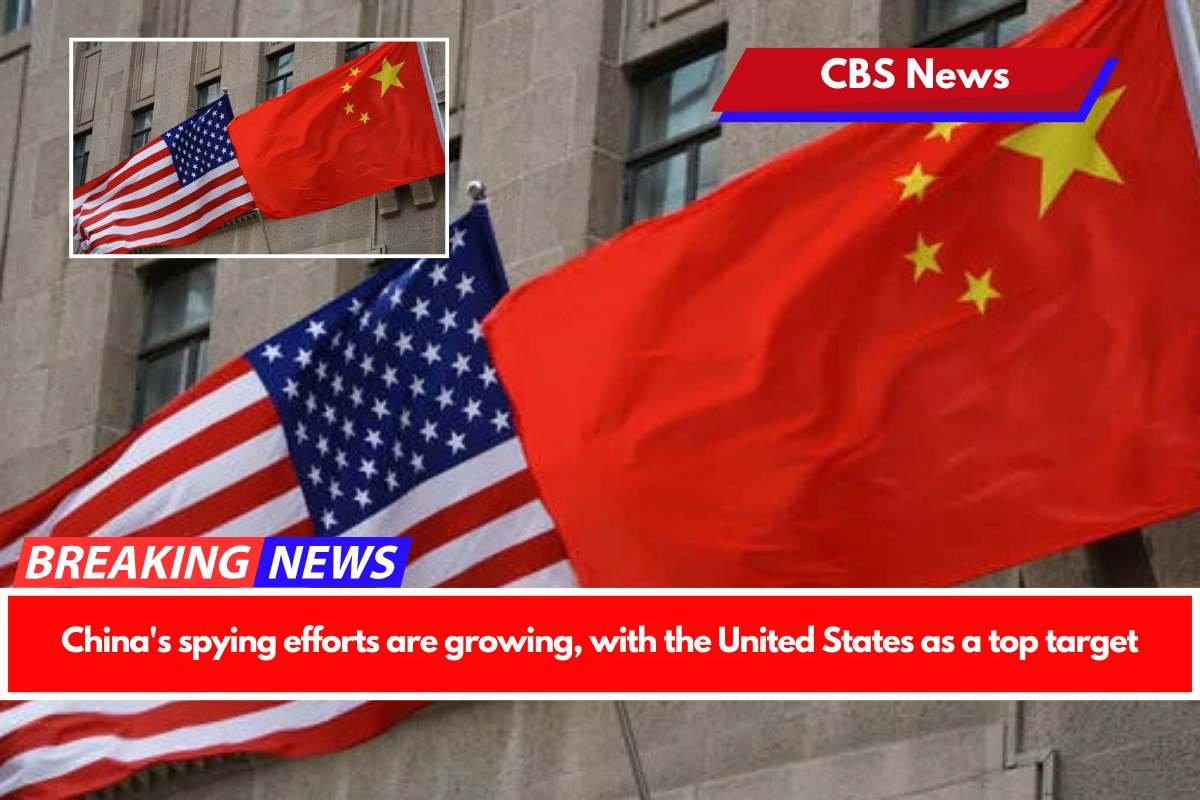Chinese pro-democracy activists in the United States have grown increasingly concerned about who might be watching them.
Former diplomat Jim Lewis, who has direct experience with China’s intelligence agencies for over 30 years, says that since Chinese President Xi Jinping took office in 2012, China’s spies no longer appear to fear the United States. China’s Ministry of State Security, or MSS, is the world’s largest and most active spy agency, according to Lewis.
“This is – in scale and in scope and in brazenness – the biggest espionage operation against the U.S. in its history,” Lewis told reporters.
China’s espionage operation
According to the most recent assessment by America’s intelligence agencies, China poses the most active and persistent cyber threat to the United States, but hacking has not replaced Beijing’s pursuit of traditional human intelligence.
China’s Communist Party uses a global network of covert agents to monitor and influence events beyond its borders. It also monitors and intimidates Chinese dissidents in the United States.
Last year, a Ministry of State Security propaganda video on WeChat, China’s largest social network, boasted that the spy agency “senses things before they happen” and “fights against evil.” The video sends a public message to both foreign adversaries and Chinese citizens about the ministry’s increasing power.
One estimate suggests that the MSS could have up to 600,000 employees.
And they are determined to go after the United States,” Lewis stated. “We are target number two for them.”
Xi’s primary target is China’s own citizens, some of whom live in the United States. According to Lewis, Xi seeks to maintain absolute power at home by looking abroad.
“Xi Jinping probably remembers that a lot of revolutions start outside the home country, and he does not want that to happen to China,” according to Lewis. “So there is a huge effort to pay attention to the expatriate population.”
To that end, China secretly established an overseas police station in the heart of New York City. Chinese expats could renew government documents at the station, which was discovered in 2022, but federal prosecutors claimed the outpost’s primary purpose was to target and harass Chinese dissidents.
“They have done it in the Netherlands and Canada. But the idea of opening a police station in another country is a clear violation of that nation’s sovereignty,” Lewis stated.
What happens when Chinese spies are caught
After the station was closed, the two Chinese-Americans who allegedly opened it were charged with conspiracy to act as unregistered foreign agents of China. One of the defendants eventually pleaded guilty.
Over the last five years, the Justice Department has charged more than 140 people with felonies related to harassment, hacking, and spying for China in the United States.
Linda Sun, one of the accused, previously worked for New York Governor Kathy Hochul. Federal prosecutors allege she accepted millions of dollars to influence who Hochul met with and what the governor said about China. Sun and her husband, who have pleaded not guilty, owned a multimillion-dollar Long Island home and a condo in Hawaii.
“Everybody leaves a record. “Some records are more flamboyant than others,” Lewis explained.
Others, like the trail left by 76-year-old retired historian Shujun Wang, are more understated.
Wang was convicted in August on four counts of making false statements, illegally possessing democracy activists’ identification, and acting as China’s unregistered foreign agent. On April 14, he was sentenced to three years supervised release for spying for the Chinese government. A federal judge spared Wang from prison due to health issues, including cognitive decline, but reaffirmed that he committed “serious” crimes against the United States.
Wang arrived in the United States from China in 1994 as a visiting scholar at Columbia University in New York, which has the highest concentration of exiled Chinese activists anywhere in the world. Wang helped found the Hu Yaobang and Zhao Ziyang Memorial Foundation, a group dedicated to Chinese democracy that met on a regular basis.
Wang told 60 Minutes that he was eager to promote democracy. He became a trusted member of the Chinese dissident community, taking notes on who attended pro-democracy meetings and what they said as the foundation’s publicity director.
However, for 17 years, he was also spying for China.
The Justice Department indicted Wang in 2022 for sharing dissidents’ names, contact information, and private conversations at the request of the MSS. When asked about sharing information with China’s largest intelligence agency, he says it is a “very big misunderstanding”. Wang pleaded not guilty.
How China recruits its spies in the U.S.
“Throughout the trial, they were extremely cautious. They never used the term’spy.’ “Just look at the records,” he told 60 Minutes. However, trial transcripts show that federal prosecutors stated three times that Wang was “spying” for the Chinese government and “used his position to spy on and betray other pro-democracy advocates.”
Wang repeatedly denied having any contact with the MSS, but federal prosecutors claim Wang met with MSS officers in China, and search warrants allowed the FBI to obtain text messages and emails exchanged between them. The texts revealed that the officers offered Wang plane tickets, and he later told federal agents that they assisted his family in China with a business dispute.
In 2021, an undercover FBI agent posing as a Ministry of State Security operative knocked on Wang’s door, offering to help him delete communications from his computer that could incriminate him if the US tried to prosecute him. Wang thanked the man for his assistance, according to video footage of the incident.
Wang was convicted in August on four counts of making false statements, illegally possessing democracy activists’ identification, and acting as China’s unregistered foreign agent.
Wang’s lawyers, Zachary Margulis-Ohnuma and Kevin Tung, admit their client communicated with Chinese intelligence officers, but claim he did not violate the law.
“Our position has always been that he never had the intent to be an agent of the Chinese government,” says Margulis-Ohnuma.
They claim FBI agents pursued Wang after they were unable to recruit him for the U.S.
“They felt a little vindictive, angry, and frustrated about their inability to stop higher-up actual espionage,” Margulis-Ohnuma said, adding that his client was made a “fall guy.”
Wang’s lawyers claim he had no access to any top-secret information, pointing out that Wang passed along documents such as an attendance sheet from a pro-democracy event.
“So there is no evidence of any harm to the United States’ interests or to democracy movement interests from anything that he did,” according to Margulis-Ohnuma.
When asked about Wang, China analyst Jim Lewis, now a distinguished fellow at the Center for European Policy Analysis, told 60 Minutes that “he was an agent.” He worked with the Chinese government to identify targets for surveillance and compromise.”
Lewis believes there is still no substitute for on-the-ground human intelligence, even if Wang appeared to be a disposable asset for China’s top spy agency.
“The Chinese are very good, so he was not at the top of the list of assets to protect. That means other assets are protected.”
The pro-democracy activists being spied on
Two pro-democracy activists based in the United States who spoke with 60 Minutes are concerned about being watched by Chinese spies in America, and for good reason.
When Shujun Wang returned to New York from a trip to China in 2019, his luggage contained Anna Yeung-Cheung’s name and contact information, as well as that of 63 others. At his trial, she testified against him.
Yeung-Cheung, who was born in Hong Kong, said she never imagined Wang would be reporting to people in China about what she was doing. Yeung-Cheung, now a US citizen, organizes demonstrations in support of the Hong Kong democracy movement in the United States.
She believes Chinese spies are gathering information for Beijing about what is being said at protests and how many people attend.
“Are these their tactics? “They try to silence you, harass you, or intimidate you into stopping what you are doing,” she said.
Hong Kong authorities have offered 1 million Hong Kong dollars (approximately $130,000 USD) for information leading to Anna Kwok’s arrest due to her outspoken activism. Kwok now leads the pro-democracy organization that Yeung-Cheung co-founded. She is currently seeking political asylum in the United States.
Kwok’s father and brother were arrested in Hong Kong earlier this month, shortly before her 60 Minutes interview aired. Kwok claims she sees posts about herself on social media every day, including threats to kidnap her and bring her back to China. Kwok believes that if she returns to China, she will face life in prison.
“They see me as a traitor, as someone who betrays the Chinese government and the Hong Kong government,” according to her.
In March, the Trump administration imposed sanctions on Hong Kong officials who had targeted Kwok and 18 other prominent activists living abroad.
Kwok claims she has committed no crimes, but the Chinese government regards fighting for democracy as criminal.
“Honestly, with China’s long arm repression, it is difficult to feel free anywhere in the world,” Kwok told the BBC. “The thing about the Chinese government is that you can leave the country and the territory, but never leave their governance.


















Leave a Reply